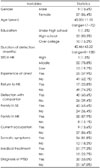Abstract
Objectives
This study was conducted to evaluate post-traumatic stress disorder (PTSD), the quality of life and social adjustment of North Korean refugees who consulted psychiatric clinics.
Methods
A total of 66 North Korean refugees who consulted a psychiatric clinic were included in the analysis. A psychiatrist conducted interviews with the subjects, and PTSD was diagnosed using the clinician-administered PTSD Scale. The quality of life of the subjects was evaluated using the World Health Organization Quality of Life Scale.
Results
Thirty five (53%) were diagnosed with PTSD. Quality of life was found to show association with understanding the language in South Korea, difficulty interacting with South Koreans, and experience or feeling of neglect. Quality of life of the PTSD group was lower than in the Non-PTSD group. Difficulty adapting to South Korean society was also higher in the PTSD group. Experience or feeling of neglect was negatively correlated with the quality of life in the PTSD group.
Figures and Tables
Table 2
Correlations among demographic data, difficulty of adjustment, and quality of life in North Korean defectors (n=66)

Table 3
Group difference of quality of life and difficulty of adjustment among North Korean defectors

References
1. Unikorea.go.kr [homepage on the Internet]. Seoul: Ministry of Unification;cited 2014 Apr 28. Available from: http://www.unikorea.go.kr/content.do?cmsid=1518.
2. Kim YH, Jeon WT, Cho YA. A study on the prevalence and the influencing factors of the mental health problems among recent migrant North Koreans: a focus on 2007 entrants. J Korean Unification Policy Stud. 2010; 19:141–174.
3. Fazel M, Wheeler J, Danesh J. Prevalence of serious mental disorder in 7000 refugees resettled in western countries: a systematic review. Lancet. 2005; 365:1309–1314.

4. Bauer M, Priebe S. Psychopathology and long-term adjustment after crises in refugees from East Germany. Int J Soc Psychiatry. 1994; 40:165–176.

5. Lee Y, Lee MK, Chun KH, Lee YK, Yoon SJ. Trauma experience of North Korean refugees in China. Am J Prev Med. 2001; 20:225–229.

6. Kang SR. Development of trauma scale for North Korean refugee [dissertation]. Seoul: Yonsei University;2006.
7. Kim HH, Lee YJ, Kim HK, Kim JE, Kim SJ, Bae SM, et al. Prevalence and correlates of psychiatric symptoms in North Korean defectors. Psychiatry Investig. 2011; 8:179–185.

8. Cho YA, Kim YH, You SE. Predictors of mental health among North Korean defectors residing in South Korea over 7 years. Korean J Couns Psychother. 2009; 21:329–348.
9. Weathers FW, Keane TM, Davidson JR. Clinician-administered PTSD scale: a review of the first ten years of research. Depress Anxiety. 2001; 13:132–156.

10. Blanchard EB, Hickling EJ, Taylor AE, Forneris CA, Loos W, Jaccard J. Effects of varying scoring rules of the Clinician-Administered PTSD Scale (CAPS) for the diagnosis of post-traumatic stress disorder in motor vehicle accident victims. Behav Res Ther. 1995; 33:471–475.

11. Min SK, Lee CI, Kim KI, Suh SY, Kim DK. Development of Korean Version of WHO Quality of Life Scale Abbreviated Version (WHOQOL-BREF). J Korean Neuropsychiatr Assoc. 2000; 39:571–579.
12. Jeon W, Hong C, Lee C, Kim DK, Han M, Min S. Correlation between traumatic events and posttraumatic stress disorder among North Korean defectors in South Korea. J Trauma Stress. 2005; 18:147–154.

13. Kang HY, Byeon SH, Shin SH, Kim HC, Lee SH, Yoo SY. A study of psychiatric problems of North Korean refugees who visited a psychiatric clinic. Sleep Med Psychophysiol. 2012; 19:35–41.
14. Cho YA, Jeon WT, Yu JJ, Um JS. Predictors of depression among North Korean defectors: a 3-year follow-up study. Korean J Couns Psychother. 2005; 17:467–484.
15. Blair RG. Risk factors associated with PTSD and major depression among Cambodian refugees in Utah. Health Soc Work. 2000; 25:23–30.

16. Fenta H, Hyman I, Noh S. Determinants of depression among Ethiopian immigrants and refugees in Toronto. J Nerv Ment Dis. 2004; 192:363–372.

17. Shalev AY, Freedman S, Peri T, Brandes D, Sahar T, Orr SP, et al. Prospective study of posttraumatic stress disorder and depression following trauma. Am J Psychiatry. 1998; 155:630–637.

18. Kim JY, Choi JH, Ryou WJ. Impact of PTSD on North Korean' defector's social adjustment in South Korea. Korean J Soc Welf Stud. 2012; 43:343–367.
19. Park SS. A study on the life stress, self-esteem and depression status of saeteomins in Gwangju city and Jeonnam province [dissertation]. Gwangju: Chonnam National University;2006.
20. Lee SY. Correlations between traumatic experience and marital sattisfaction scale of an escapee from north Korea: centered on dwelling in North Korea, escaping from North Korea, adapting to South Korea [dissertation]. Seoul: Korea University;2006.
21. Keyes EF. Mental health status in refugees: an integrative review of current research. Issues Ment Health Nurs. 2000; 21:397–410.

22. Lee JM, Hwang SY. Identifying factors affecting the adaptation of North Korean refugees in South Korea. Soc Welf Policy. 2008; 33:61–84.




 PDF
PDF ePub
ePub Citation
Citation Print
Print




 XML Download
XML Download